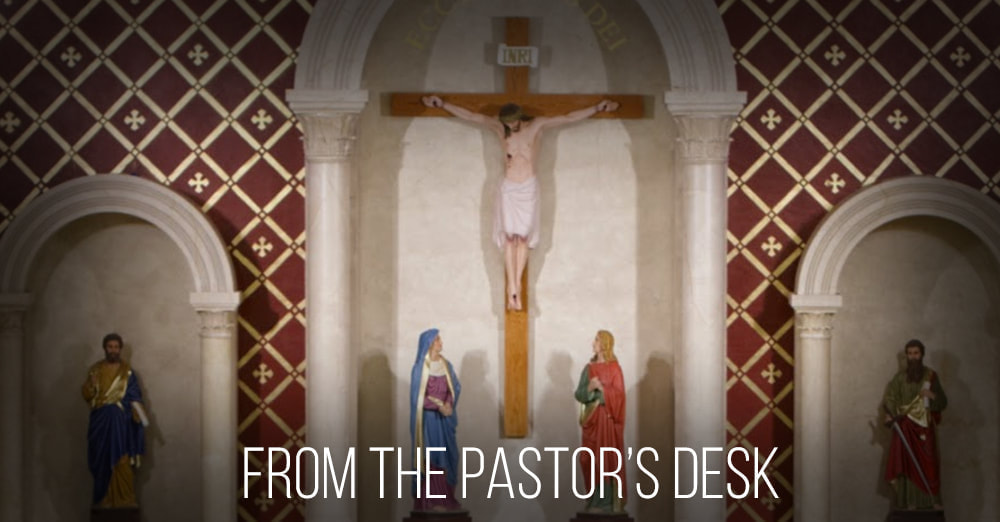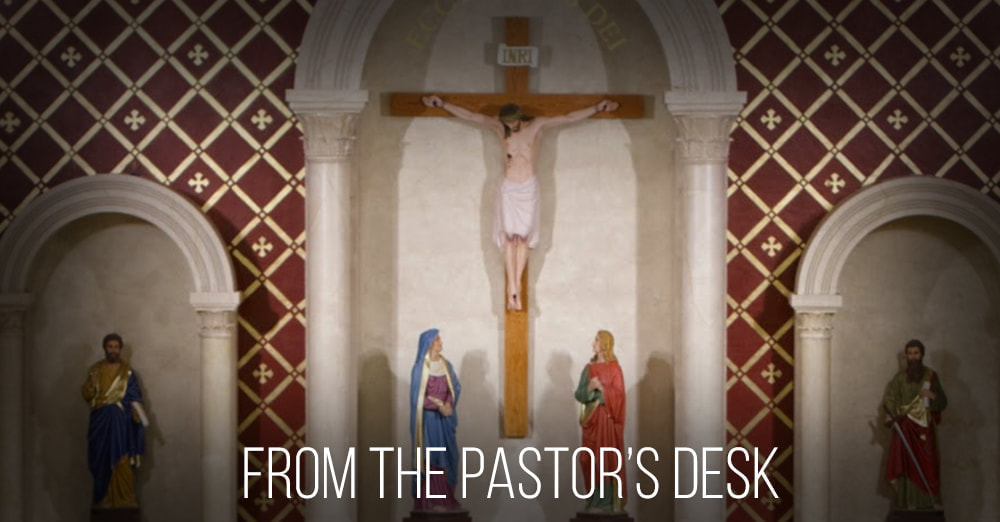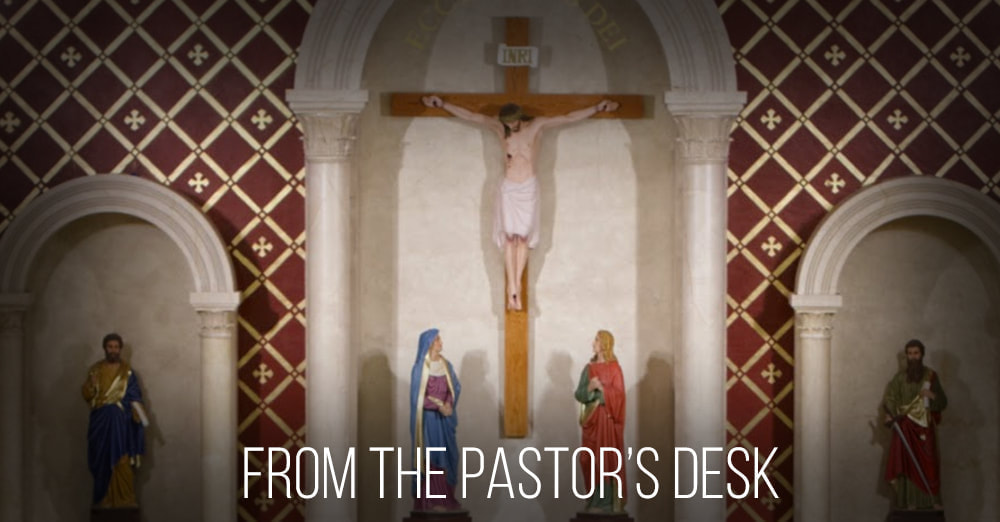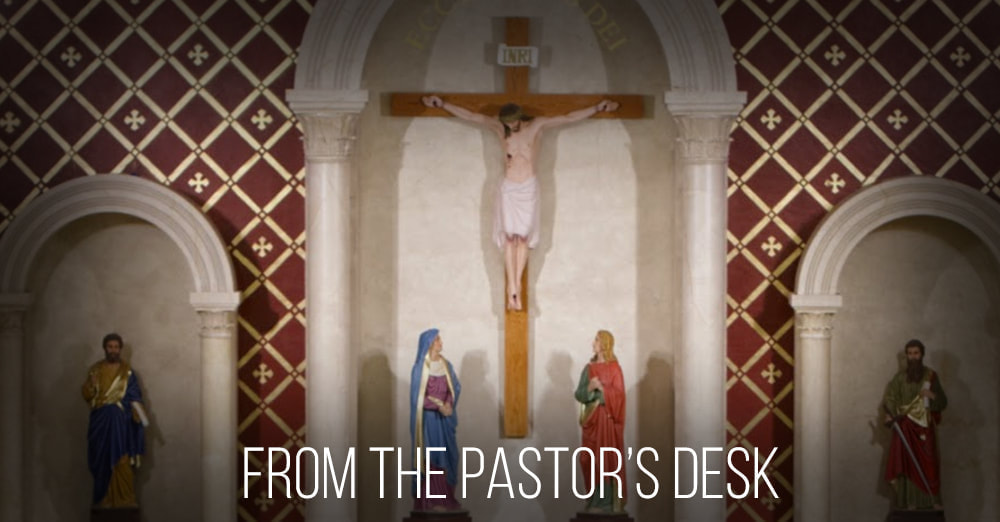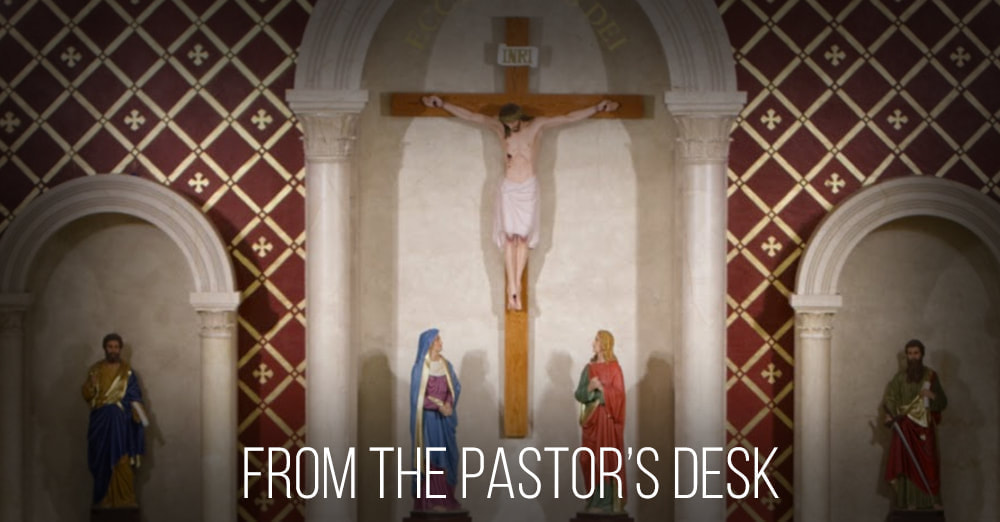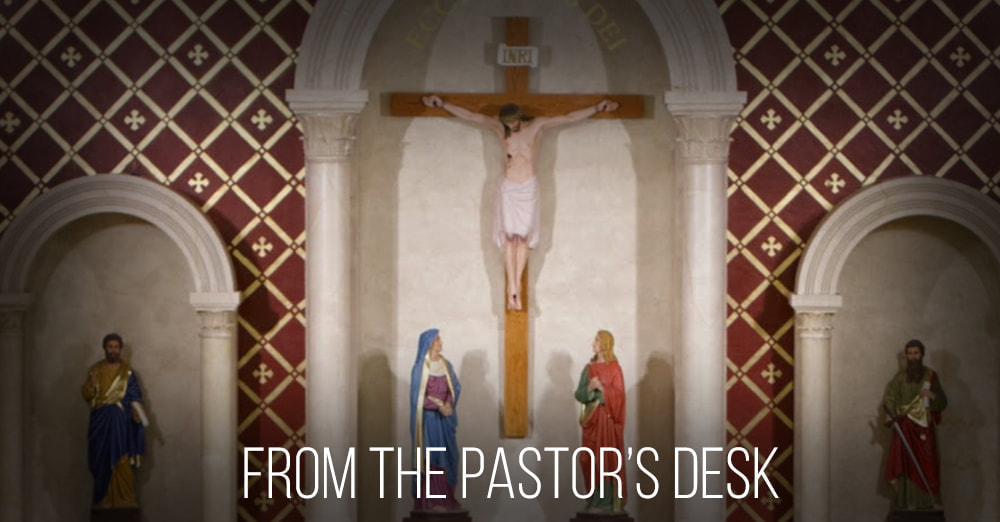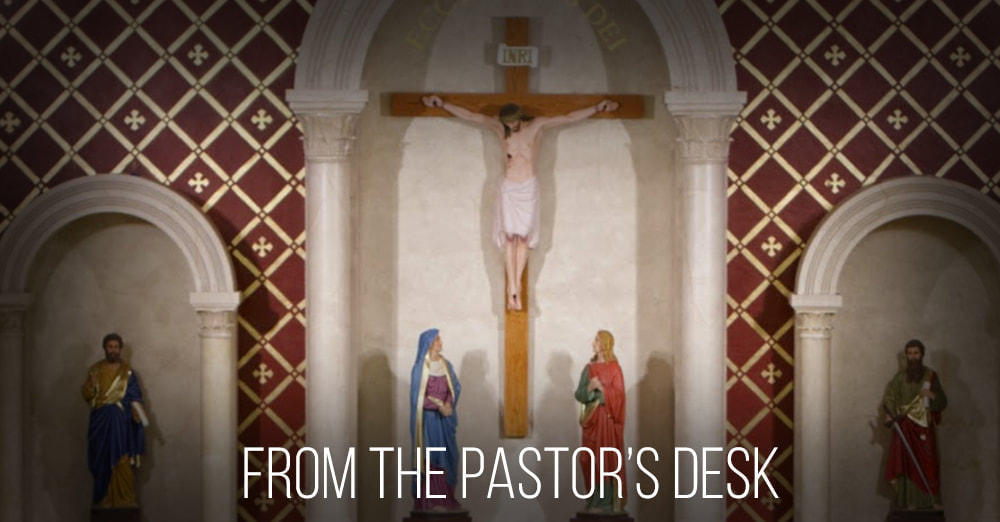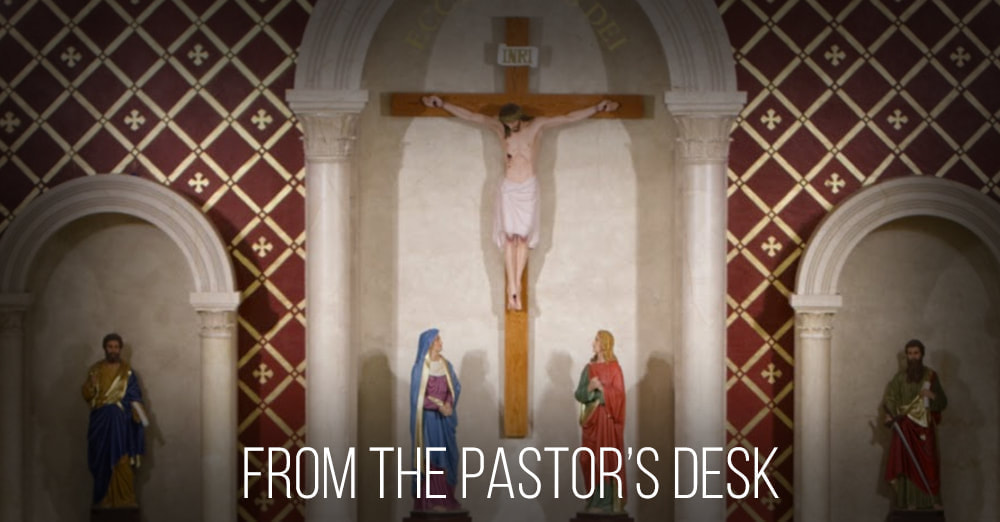|
In both the reading from Genesis and the Gospel in today’s Mass, we see Satan, or the Devil, mentioned. The reality of Satan is a challenge for Modern Man. With the arrival of the Age of Enlightenment (so called) in the 18th century, it became fashionable to believe that everything could be understood through reason and science alone. The Modernism of the mid 19th century intensified this belief, such that the Church in response began to speak explicitly about the errors of Modernism, especially its rejection of religious belief. Just one example of this is the rejection of spiritual beings, since the only reality the modernists accept must be physically observable. So, angels – good or fallen – don’t really exist, they are merely mythical beings created from our imaginations in order to explain things we don’t understand. But NOW, “science” provides all the answers, and we can do away with these mythical beings. Of course, the Church has always held fast to the Biblical accounts of the existence of spiritual creatures. Angels – the good ones, like Michael, Gabriel, and Raphael; and the fallen ones, like Satan – really do exist. In the Book of Revelation (Ch. 12), we read how Jesus brings about the defeat of “that ancient serpent, who is called the Devil and Satan.” Pope Francis, even more so than his predecessors, often speaks of the nefarious works of the Devil. Indeed, the Catholic has always been deeply aware that the disciple of Jesus Christ will have to contend with “the World, the Flesh, and the Devil.” Certainly, even in our everyday pursuits, we are aware of particular obstacles which may impede, or make difficult, the goal we seek. Every runner surveys the course where he runs; every golfer looks out for the sand traps. In this sense, the things of this world, our own human weaknesses, and the temptations of the Devil, are all obstacles which we contend with in our journey to Christ. But in and through Christ, we triumph! We are most fortunate to host the Eucharistic Pilgrim- age through our city. I hope you’ll join me and many others for the Eucharistic Procession today (Sunday) at 4:30pm at the Jackson Street Bridge; the procession to SSPP church for a Holy Hour of Adoration, Mass at 6pm, and good food and drink at the reception which follows on the church grounds. May God bless you! Fr. Schaller The Solemnity of Pentecost marks the end of the Church’s observance of the Easter Season. This celebration commemorates the coming of the Holy Spirit upon the Apostles, the Blessed Mother, and the whole Church. The coming of the Holy Spirit on Pentecost also fulfills God’s revelation of Himself in three divine persons: The Father is made known through His creation, the Son in the Incarnation, and now the Holy Spirit is revealed as “the Lord, the giver of life, Who proceeds from the Father and the Son” (Nicene Creed). Our Lord and Savior, Jesus Christ, promised to send to His Church the Comforter, the Advocate, Who would strengthen and confirm us in our faith. “Come Holy Spirit, fill the hearts of your faithful, and kindle in them the fire of your love!” The period of time between the Lord’s Ascension into heaven and the descent of the Holy Spirit on Pentecost Sunday has always been observed as a special time of prayer. Scripture tells us that Jesus ascended to heaven 40 days after Easter and Pentecost occurred 50 days after Easter. The Lord instructed His disciples to spend the nine days between those events praying. This is the origin of the Catholic practice of the “novena” (from the Latin word for “nine”.) A novena consists of praying for some particular intention for nine consecutive days. Sometimes this is expressed in prayers or practices which are observed over nine weeks or nine months (such as the custom of attending Mass for nine consecutive First Fridays). It’s just another example of one of the those “Catholic things” that we didn’t just make up but comes from the scriptures and the practice of the early Church. Tomorrow (Monday) Deacons Ruesch and Biolo, and Fr. Williams and I will join all the priests and deacons of the Diocese, along with many other guests, in attending the installation Mass for Bishop Gerard Battersby, the 11th Bishop of the Diocese of La Crosse. As we pray for our retiring bishop William Callahan, also join me in praying that Bishop Battersby will be strengthened by the Holy Spirit to be a true, faithful, prudent, and courageous shepherd! May God bless you! Fr. Schaller Many years ago St. Pope John Paul II designated this Sunday as the World Day of Prayer for Vocations. Here at SSPP & SVdP we pray after every Mass for vocations: for priests and deacons, for religious men and women, and for married and single people, too. We do that because all Christians have a vocation. We have a common vocation - that is, a call from God - to holiness. But the common vocation to holiness that God calls us to must be lived out in a definite way. For priests it means a certain way of living, for consecrated men and women (the religious life) it means another, and for single people and married people it means living faithfully according to those states of life. For all, the common goal is holiness - that is, a life in communion with God. There always remains a temptation to mediocrity - the easy way: “What’s the least I have to do to get into Heaven?” or “What’s the most I can get away with, and still avoid Hell?” The example of St. Pope John Paul II has shaken us from this sort of spiritual lethargy. His life was a visible reminder of the sacrifice that is required from each authentic follower of Christ – and validation that the sacrifice is worth it. While affirming the truth that ALL of us are called to a life of holiness, the Church still demands a unique witness from her priests. Some people suggest that if we would ‘soften the sacrifice’ of the priesthood – by relaxing the rule of celibacy and ordaining married men – we would have many more priests. But that argument fails even on natural grounds. For example, why does the most difficult and disciplined branch of the military services – the Marine Corps – regularly fill its quota of enlistees when the other branches sometimes struggle to do so? Answer: because it is in the very heart of a young man to seek, and embrace, a challenge. Well, John Paul II understood that principle very well. He challenged young people to reject the selfishness of materialism, and to follow Christ. And the young people loved him. Most of the millions who flooded Rome after his death in 2005 were young people. To these same young people the Pope has entrusted the mission of the New Evangelization. What is that mission? To help each person follow Christ. To help each person be holy. May God bless you! Fr. Schaller From time to time one reads in one of the national news magazines, or sees on one of the cable TV channels, some (reputed) scripture scholar who questions the traditional understanding of the nature of Jesus, and the truth of His resurrection. These articles (or programs) are especially common at this time of year. Each year at Easter we proclaim who Jesus is: the son of God and the son of Mary, who suffered, died, and truly - bodily - rose from the dead. The Gospel from today’s Mass records for us another instance where Jesus appears to His disciples. He invites them to touch Him to see that He is not a ghost. And then He ate with them to give them further proof. I can’t imagine what kind of faith those “doubting scholars” would expect us to have if we accepted what they propose. I propose we stick with the testimony of the Apostles and the creed that we recite each Sunday at Mass. Our Faith is not made up of fanciful notions, myths, or legends. It is real, true, and historical. We typically celebrate many sacraments in the Easter season, especially the three Sacraments of Initiation: Baptism, Confirmation, and Holy Communion. At the Easter Vigil we received the Daniel & Laura Flood family into the Church at SSPP; and we look forward to the baptism of several children in the upcoming weeks. The young children of both parishes will be receiving their First Holy Communion on Sunday, May 5. And last Saturday Bishop Callahan confirmed 54 young people from the WI Rapids Deanery, including 5 from SVdP and 8 from SSPP. Please pray for our newly Confirmed, that, having been “sealed with the Gift of the Holy Spirit”, they may be strengthened to live a full, conscious, and active life as true sons and daughters of the Father, and fervent disciples of our Savior, Jesus Christ! May God bless you! Fr. Schaller “I will be their God, and they shall be my people.” That short passage from today’s first reading from the prophet Jeremiah expresses a simple and beautiful truth. God has formed with us a covenant – an irrevocable bond of love. This covenant has been renewed with us in a definitive way in the Sacrifice of Jesus Christ. We are reminded of this each time at the Mass when the priest says the words of the Lord which He spoke at the Last Supper: “This is the Chalice of My Blood, the Blood of the new and eternal covenant.” Each time we receive the Lord in the Holy Eucharist we say our “Amen” to this covenant.
Next Sunday we begin Holy Week with the commemoration of the Lord’s triumphal entry into Jerusalem on Palm Sunday. We read two Gospel accounts on Palm Sunday: this year from St. Mark. First we read the (briefer) passage recounting our Lord’s entry into Jerusalem. Then, after the readings from Isaiah and Paul’s Letter to the Philippians, we read the long Passion narrative. It serves as a sort of prelude to the events which we commemorate during Holy Week. As preparation for Holy Week, I encourage you to read this week those Gospel ac- counts from St. Mark. Along with your other Lenten practices this will be an effective means to follow our Lord more closely as we celebrate these great Mysteries of Faith. We are entering the final weeks of Lent. Let’s sprint to Easter! May God bless you! Fr. Schaller The different seasons of the Church (Liturgical) Year present us with opportunities to express our faith in a variety of ways in accordance with our human nature. For example, this season of Lent is an occasion for disciplining our bodies and our spirits. Just as every athlete needs training to sharpen his skills and tone his muscles, so the Christian’s spiritual life needs training to “tone” his soul. Since God made us with a body and soul, it is natural and good that we discipline our bodies along with our souls. This is the benefit of ascetical practices (the “giving up” of certain good things which we enjoy, like sweets, television, etc.) Fasting, along with almsgiving and prayer, is the means to spiritual growth (as we heard in the Gospel on Ash Wednesday). Jesus spent forty days in the desert fasting and praying. The forty days of Lent are truly a Season of Grace, since we can become more like our Lord by following His example in prayer and fasting.
The special devotions during Lent help us to appreciate its penitential character. Please note that we have Stations of the Cross each Wednesday at 5:15pm (SSPP) and Friday at 3:05pm (SVdP), and the Sorrowful Mother Novena each Friday at 5pm (SSPP). In addition to the regularly scheduled confessions one hour before every Mass (both parishes), the Deanery Confession Day will be from Noon – 6pm on Sunday, March 10 at SSPP, so that many more people might have the chance to receive the Graces of this Sacrament. Also, as we did during Advent, we will have a Holy Hour of Adoration from 3-4pm, with Solemn Evening Prayer (Vespers) each Sunday (concluding with Benediction) at SSPP. Finally, SVdP will host the 7 Week Lenten Journey Series “Who Am I To Judge” on Monday evenings at 6:00pm in the parish Gathering Space. (See bulletin for details.) Make this a Holy Lent! May God bless you! Fr. Schaller The Gospel this week again records the healing of the sick. In this case the most horrible disease known to the ancient world, leprosy. In this column last week I spoke about the continuation of the healing ministry of Jesus present in the Church today, especially through the Sacrament of the Anointing of the Sick. I would like to review a few things about that sacrament in this column. The Catechism of the Catholic Church (CCC) teaches that this sacrament “was instituted by Christ our Lord as a true and proper sacrament of the New Testament” and “is intended to strengthen those who are being tried by illness.” (#1511) “The Anointing of the Sick is not a sacrament for those only who are at the point of death. Hence, as soon as anyone of the faithful be- gins to be in danger of death from sickness or old age, the fitting time for him to receive this sacrament has certainly already arrived.” (#1514) The oil used for the sacrament is blessed by the Bishop (at the Chrism Mass during Holy Week, along with all the oils used for the other sacraments). In the rite the priest prays over the sick person and anoints him or her on the forehead and on the palms of the hands. If possible, it is appropriate to receive the Sacrament of Penance beforehand. Though the Anointing of the Sick may be celebrated anytime in emergency, it is also proper, if it is possible to do so, to arrange its celebration (e.g., before surgery) for a time when family members can be present. The Church also recommends communal celebrations of the sacrament. (This is typically done periodically in nursing homes or care centers.) To learn more about this sacrament, I recommend reading paragraphs #1499 - 1532 in the Catechism of the Catholic Church. We begin our Lenten journey this coming Ash Wednesday. Let’s have a Holy Lent! May God bless you! Fr. Schaller The Gospels record much about the life of Christ. Frequently, as in today’s Gospel, the Gospel relates how the Lord spent His time teaching. One of the chief responsibilities of the Bishop is to teach the Faith within his diocese. Not just his ideas or opinions; but the Faith taught by Jesus, handed down by the Apostles, and still taught by the Church today. One of my responsibilities as pastor is to teach the Catholic Faith here at SSPP and SVdP parishes. And finally, parents have the responsibility (and the right!) to teach their own children within the family. The Church has always stressed the primacy of parents as the first and most important teachers of their own children, especially in matters of the Faith. Though some parents may rightly choose to homeschool their chil- dren, most make use of public, private, or Catholic schools. In every case the parents retain the privilege of directing their children’s education. It is proper for parents to have an active interest in how their schools are operated – not only regarding fiscal responsibility, but especially concerning the content of the curriculum. This applies to all schools: public, private, and Catholic schools. This week the Church celebrates Catholic Schools Week - an occasion to give thanks for all that our Catholic Schools have accomplished, and to re-commit ourselves to excellence in our Catholic Schools. I strongly encourage you who are parents to consider the value of a Catholic School education for your children. Now is an excellent time to explore the opportunities available for your child(ren) at Assumption Catholic Schools. My sib- lings and I benefitted greatly from our Catholic School experience. (For the record, I attended eight years of Catholic school at Saint Patrick’s in Onalaska, and graduated from Holmen (public) High School, and Marquette University). May God bless you! Fr. Schaller The first reading in Sunday’s Mass recounts the calling of Samuel by God. God revealed Himself in a special way to His prophets. No one simply decided, “I think I’ll be a prophet”. One had to be called by God. The same holds true in the New Testament, which is seen in the Gospel with the calling of the Apostles by Jesus. From the beginning God has called men to serve Him; He continues to do so today when He calls men to serve as priests. All my predecessor pastors here at SVdP and SSPP, all the priests serving in our diocese, and I all experienced that call. Certainly, such a call is felt in the heart of a man; it is an interior and personal experience. Nevertheless, in order to ensure that such a call is authentic, it needs to be confirmed by those to whom the Lord entrusted His pastoral care. In the case of Sunday’s first reading, it was Eli who helped Samuel discern that God was calling him. In the Church today the Bishop has that responsibility. He will often appoint others to assist him in this important task. Fr. Nate Kuhn, our Diocesan Vocation Director, visits all our seminarians during the school year (we have men studying at several seminaries), confers with their teachers and spiritual advisors, and ensures that each seminarian is receiving the proper academic, human, and spiritual formation necessary for him to discern his calling to the priesthood. Fr. Kuhn also works with the parish priests, and the Chaplains at our Catholic High Schools and Newman University parishes, to make more young men aware of the need for good priests and the need for each of them to consider his own vocation. Continue to pray for all our diocesan seminarians. And pray that they, and all young men and women, will be given the courage to consider well the plan that God has for them. Ash Wednesday, and the beginning of Lent, is just a month away! In preparation for Lent I’m asking that you collect your palms from past years’ Palm Sunday, and place them in the box provided in the gather space (SVdP) and Holy Family Cenacle (SSPP). We will burn them after Mass on Sunday, February 11, and the ashes used to mark our heads on Ash Wednesday, Feb. 14. May God bless you! Fr. Schaller Mark Twain once said, “When I was 18, I thought my father was an old fool. When I turned 21, I was surprised at how much he had learned in 3 years.” The book of Sirach (today’s optional first reading, Sirach 3:2-6, 12-14) teaches a truth that Mark Twain apparently eventually learned. To respect and honor one’s parents is not only a commandment from God; it is also just and good. The admonition to “care for your father when he is old” takes on an even greater urgency in our own culture where more people are living longer. A number of cultural changes make fulfilling this commandment seemingly more difficult. Among these are: fewer children (to take care of aging parents), more mobility (children live hundreds or thousands of miles from parents), and a cultural attitude which more and more considers “unproductive” persons as a burden on society. To address these issues the Church must integrate the truth of God’s Word with wise planning. It is encouraging to see efforts made to make “homes for the aged” much more like homes. I have heard and read of such homes being built near elementary schools so that both the young and the old benefit from each other’s presence. This seems like a good idea. Still, the best choice ought to be for the family itself to take care of aging parents. Though not always possible – especially when medical care is needed – the care of aging parents within the home can be a true blessing to the whole family. God promises a blessing upon those who honor their parents.
According to IRS regulations, donations to our parish must be received (or postmarked) by December 31, 2023 in order to be considered a charitable gift for the current tax year. Your financial support of St. Vincent de Paul and SS Peter & Paul Parish is needed and is deeply appreciated! On behalf of Fr. Daniel Williams, Deacons Jerry Ruesch & Tony Biolo and all the staff, I want to thank you for the many Christmas gifts, cards, and greetings we have received. May God bless you and your family during this Holy Season of Christmas! And may 2024 be a year of grace, peace, and blessing!! May God bless you! Fr. Schaller |


